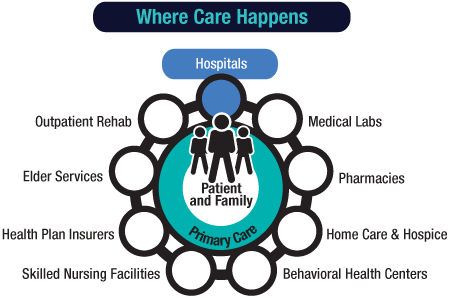
What Is a Hospital?
A hospital is a healthcare facility where people go when they need serious medical care. Hospitals are open 24 hours a day and provide a wide range of services, including emergency treatment, surgeries, and recovery care. Unlike doctor’s offices or small clinics, hospitals are designed to treat patients who need more advanced or immediate attention.
Hospitals come in many sizes. Some are small community hospitals that serve local neighborhoods, while others are large medical centers connected to universities where doctors also teach and do research. No matter the size, all hospitals aim to help people heal, recover, and stay healthy.
Working in a Hospital
Hospitals are busy places that depend on teamwork and quick thinking. Here are a few important things to know about the hospital work environment:
Always Open
Hospitals operate every day, all day—including weekends and holidays. That means some staff work night shifts or must be available in case of emergencies, such as natural disasters or severe weather.
Fast-Moving and High-Pressure
In hospitals, patient needs can change quickly. Decisions often need to be made right away, especially in emergency situations. Healthcare workers must be focused, calm under pressure, and ready to adapt.
Teamwork Matters
Hospitals rely on many professionals—doctors, nurses, therapists, technicians, and support staff—working together. Good communication and collaboration are essential to delivering safe, high-quality care.
Departments in a Hospital
Hospitals are made up of different departments that each focus on a certain type of care or service. Here are some of the main areas you’ll find in most hospitals:
Patient Care Departments
- Emergency Department (ED): Treats people who need care right away due to serious illness or injury.
- Intensive Care Unit (ICU): Provides constant care for patients who are very sick or recovering from major surgery.
- Medical-Surgical Unit: Cares for patients recovering from surgery or being treated for general health conditions.
- Labor and Delivery: Supports patients during childbirth and recovery.
- Pediatrics: Specializes in treating infants, children, and teenagers.
- Operating Room (OR): Where surgeries take place.
- Outpatient Clinics: Provide check-ups, tests, and treatments that don’t require an overnight stay.
Diagnostic and Treatment Services
- Laboratory Services: Test blood and other samples to help doctors figure out what’s wrong.
- Imaging and Radiology: Use tools like X-rays, CT scans, and MRIs to look inside the body.
- Pharmacy: Prepares medications and checks for safety.
- Physical and Occupational Therapy: Help patients regain strength, movement, and independence after illness or injury.
- Respiratory Therapy: Helps people with breathing problems, including those using oxygen or ventilators.
Support Services
- Food and Nutrition Services: Prepare meals for patients and help with nutrition plans.
- Housekeeping (Environmental Services): Keep the hospital clean and help prevent the spread of infections.
- Biomedical Engineering: Fix and maintain medical equipment.
- Facilities and Maintenance: Take care of the hospital building and make sure everything runs smoothly.
Administrative and Technology Departments
- Admissions and Registration: Help patients check in and collect important information.
- Medical Records (Health Information): Organize patient files and health history securely.
- Billing and Coding: Manage insurance paperwork and patient billing.
- Human Resources (HR): Hire staff, manage training, and oversee employee needs.
- Information Technology (IT): Keep computer systems, including digital health records, up and running.
- Interpreter Services: Help patients who speak different languages communicate with their care teams.
Careers in Hospitals
Hospitals offer a wide variety of career paths. Some roles focus on direct patient care, while others support hospital operations behind the scenes. Here are just a few examples:
- Registered Nurses (RNs): Care for patients, give medications, and help manage treatment plans.
- Nurse Practitioners (NPs): Provide advanced care, diagnose conditions, and sometimes prescribe medications.
- Patient Care Technicians: Help nurses by taking vital signs, assisting patients, and keeping records.
- Orderlies and Attendants: Help move patients safely and support daily routines.
- Respiratory Therapists: Work with patients who have trouble breathing.
- Surgical Technologists: Assist in the operating room by setting up equipment and helping during surgeries.
- Medical Billers and Coders: Make sure hospitals are paid correctly by organizing billing information and insurance codes.
- Medical Interpreters: Help patients and staff understand each other when they speak different languages.
Why Hospitals Matter
Hospitals are more than just buildings with doctors and nurses—they are essential parts of every community. They provide critical care, save lives, support recovery, and serve as places of learning and discovery. Whether someone needs emergency surgery or just help getting stronger after an illness, hospitals are there to make sure people get the care they need.
 Healthcare Workforce Partnership
Healthcare Workforce Partnership  REB - REGIONAL EMPLOYMENT BOARD OF HAMPDEN COUNTRY, INC.
REB - REGIONAL EMPLOYMENT BOARD OF HAMPDEN COUNTRY, INC.